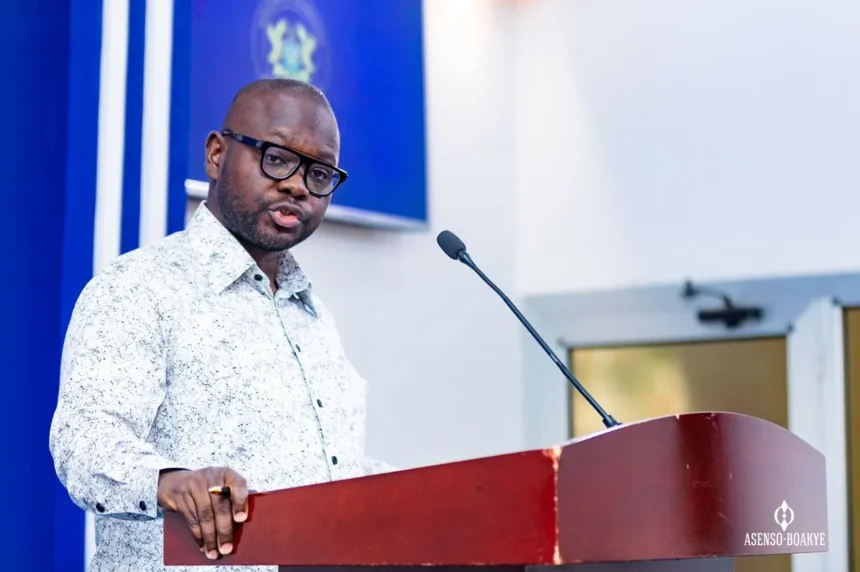The Minority in Parliament has pushed back against recent remarks by Prof Kwamena Ahwoi, former Minister for Local Government and a leading scholar on governance, describing his views on Ghana’s decentralisation process as “inaccurate” and “misleading.”
Prof Ahwoi, speaking at the National Dialogue on Decentralization and Responsive Governance, suggested that the proliferation of new districts and regions, particularly the creation of six additional regions between 2018 and 2019, was excessive and unnecessary, given that Ghana “survived with ten regions for over five decades.”
Reject
However, the Minority in Parliament has firmly rejected this assertion, stressing that decentralisation must be understood as a forward-looking process designed to empower local communities and expand development opportunities.
In a statement signed by Hon Francis Asenso-Boakye, Ranking Member on the Committee on Local Government and Decentralisation, the caucus emphasised: “Decentralisation is not merely about maintaining existing structures; it is about bringing government closer to the people and ensuring equitable development across the country. The creation of new districts and regions was, and remains, a deliberate policy choice to extend the reach of government, empower local structures, and enable previously underserved areas to directly receive attention and resources for development.”
Not an overreach
Responding directly to Prof. Ahwoi’s claim that the six additional regions represented an “overreach,” the Minority countered that such a view fails to grasp the developmental rationale behind the policy.
“The suggestion that the creation of six additional regions between 2018 and 2019 was an ‘overreach’ because Ghana survived with ten regions for over five decades is a misreading of the rationale behind the policy shift. The question was never about mere survival. It was about facilitating growth, inclusion, and accelerated development,” the statement read.
According to the Minority, the new regions and districts have already yielded dividends in infrastructure, social services, and investment opportunities, which were limited under the old regional structure.
Compliance
Prof Ahwoi had also suggested that successive presidents have failed to comply with population requirements in creating Metropolitan, Municipal, and District Assemblies (MMDAs). But the Minority dismissed this as factually inaccurate.
“Prof. Ahwoi’s claim that presidents have not kept faith with population requirements in the creation of MMDAs is not borne out by fact. Every metropolitan, municipal, and district assembly that was created, at least under the NPP administration, satisfied the population thresholds and economic viability requirements enshrined in the Local Governance Act, 2016 (Act 936). The process was undertaken with due regard to the law, not partisan convenience,” the statement asserted.
Tangible gains
Highlighting the benefits of the six new regions, the Minority pointed to concrete developments in health, education, security, and infrastructure.
“Each of the regions now has a Regional Coordinating Council with full departmental structures for Education, Health, Agriculture, and Highways, ensuring decentralised services are delivered to areas that previously had little or no access,” the statement detailed.
It further disclosed that residential facilities have been built for senior heads of public services, while all security agencies—including Police, Immigration, Fire, and Prisons—have established new regional offices with permanent infrastructure and trained personnel.
“In total, over 60 monumental developments of varying scale were completed in record time under the Akufo-Addo administration. These projects are not theoretical; they are functional, operational, and in daily use by citizens across the new regions,” the Minority added.
Dialogue
The Minority also questioned the neutrality of the platform where Prof. Ahwoi made his remarks. While acknowledging that the dialogue was framed as a forum to “reset decentralisation,” the statement argued that “the framing and theme appear politically motivated, designed to advance the agenda of the ruling party rather than provide a neutral platform for a balanced national dialogue.”
Decentralisation
The Minority insisted that decentralisation must be seen as a long-term investment in governance and development, not a matter for partisan contestation.
“Ghana’s decentralisation journey must be understood as a dynamic process aimed at deepening governance, empowering communities, and expanding opportunities for development. The creation of new districts and regions is not an overreach; it is an investment in inclusion and nation-building,” the statement stressed.
Source: asaaseradio.com




